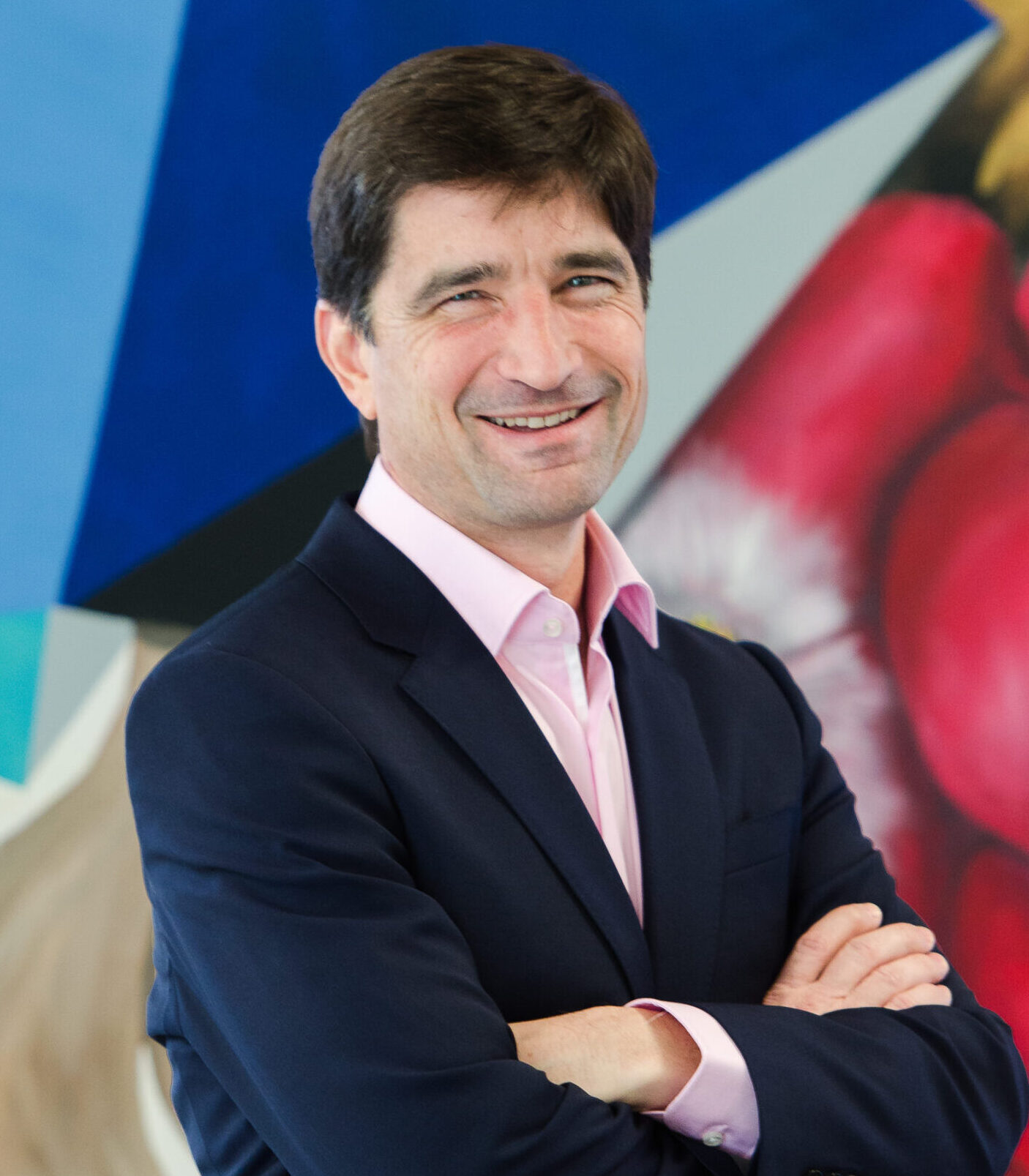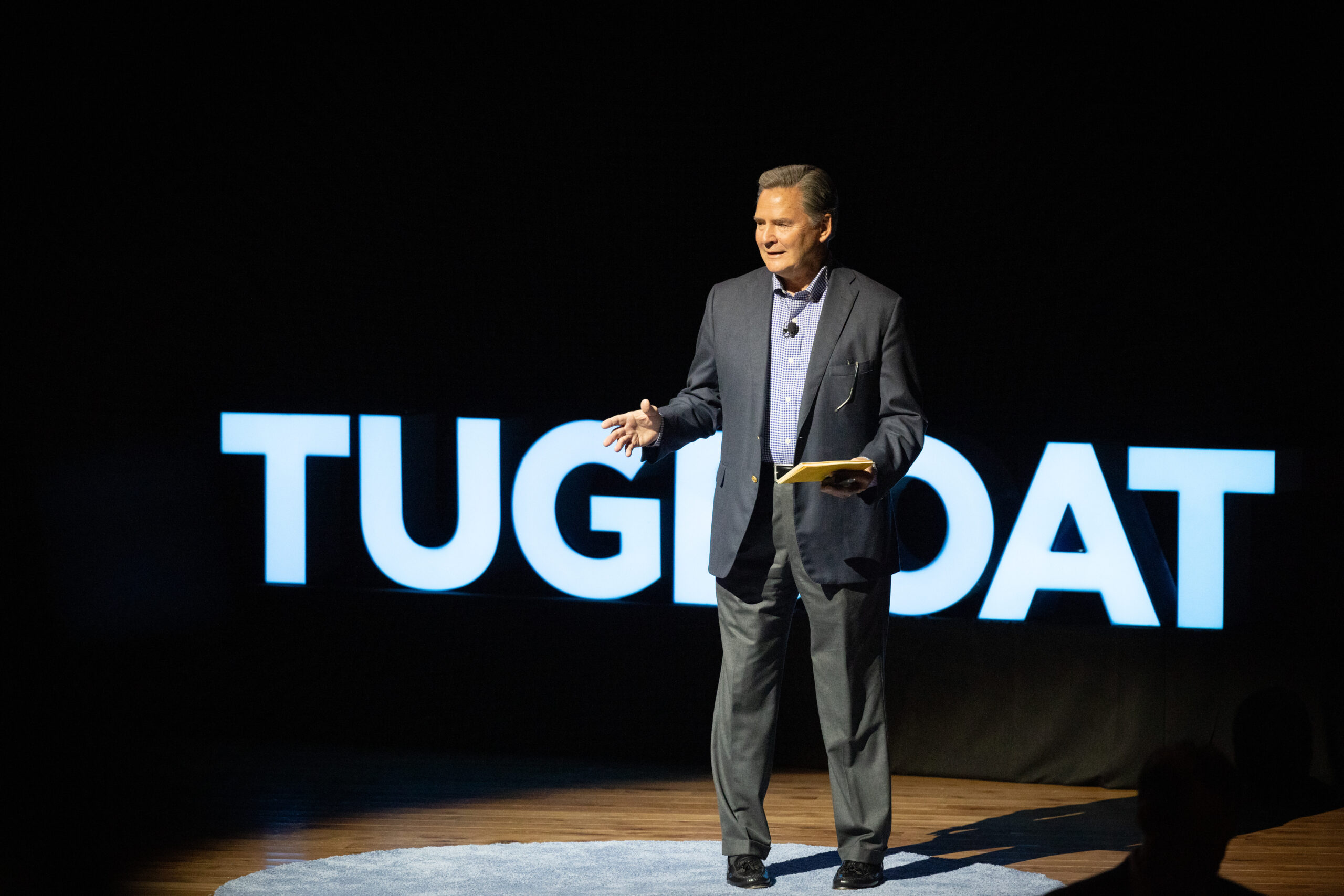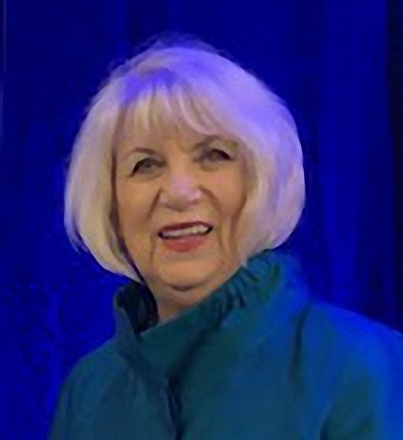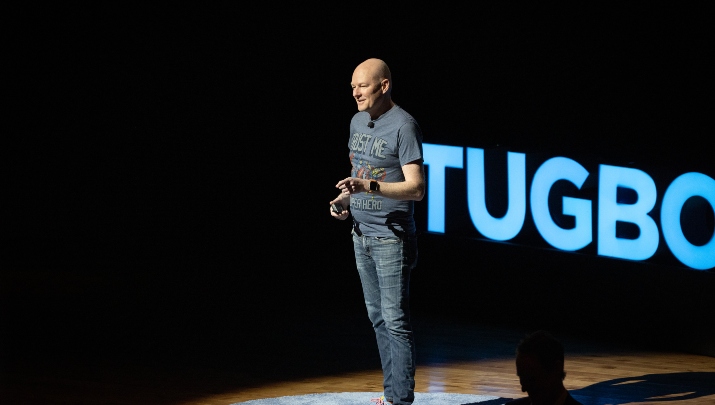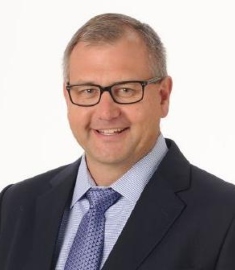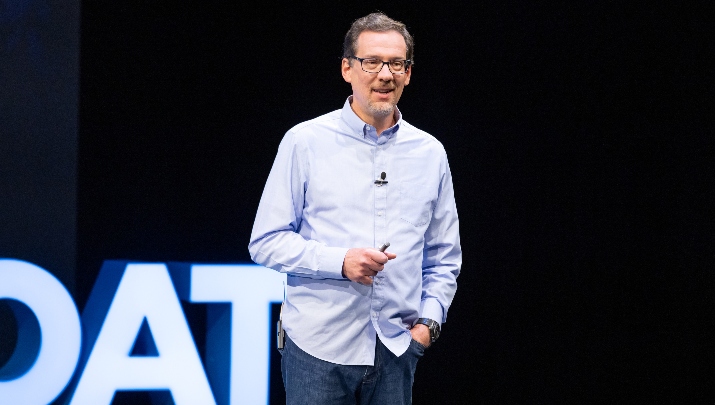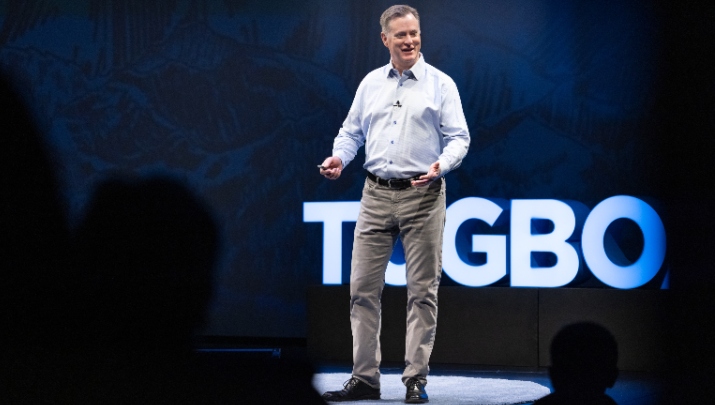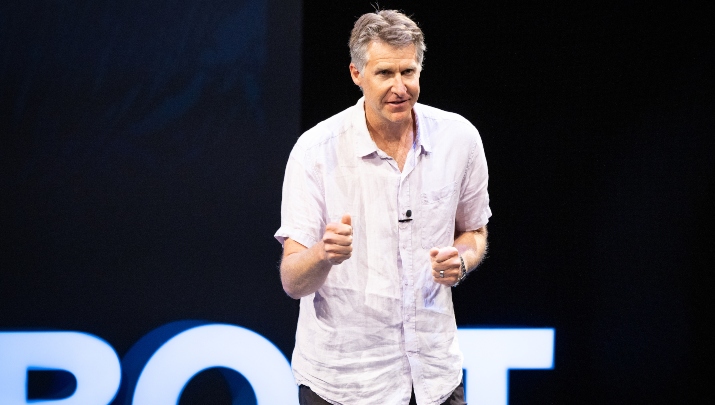When What Got You Here Won’t Get You There
I know many of you in the Tugboat Institute® community are familiar with Doug Tatum’s No Man’s Land. For those who are not, here is a brief explanation.
As companies move to scale, they almost universally reach a place where they become “too big to be small, and too small to be big,” often between 150 and 200 employees. To survive, they need to take the leap and build toward becoming a larger, more complex organization. To do this, they must build the structures to support this new version of themselves. This is expensive, and further complicated by the fact that the investment is required before the new systems and processes can start generating the revenue and profit that will support them. Especially for an Evergreen® company that is committed to growing from its own fuel and not taking on outside investors, this can feel like a leap of faith.
I think about reaching No Man’s Land like this– it’s when you get to the point where, what got you here, won’t get you there. In 2018, we unknowingly found ourselves deep in No Man’s Land in a rapidly deteriorating business; the faster we grew, the faster we lost money. We were completely unprepared.
By 2018, Northland Controls, which supplies commercial security systems and solutions, had already been in the midst of No Man’s Land for two years, but far too busy to realize we were in trouble. In fact, we kept doubling down on what got us here. Superficially, our customers were the Who’s Who of Silicon Valley and we were growing. Under the hood, our employees were stressed, our quality was deteriorating, we were missing deadlines, our bank was nervous, and our best customer called to ask what was going on.
The response from my team? “Don’t worry, we’ve got this.” But we didn’t have this at all.
In the short-term, we focused on what we knew– working hard and executing flawlessly. Our tactics were our strategy. It was enough to stop the bleeding and buy us some time, but it did not get us out of the inflection point. Fortunately, I had long ago put together a board of outsiders to advise me. My board, having a more objective perspective, took a stand. It was time to make some changes.
As I considered what would be required for us to make these changes, the reality that what got us here would not get us there was impossible to ignore. The most challenging part was taking a hard look at my team and understanding that, although we couldn’t have built Northland to where it was without certain key players, those same key players were not the ones who could lead us into our future. I had to let go of some very senior people, who had become friends and to whom I owed a great deal. I lost sleep over the decision, and it was as difficult as I imagined, but as soon as it was done, I knew it was the right move.
We began implementing our plans in 2019 and were thrilled to see positive results by June and July. Serendipitously, in June of 2019, I had the good fortune of seeing Doug Tatum speak at Tugboat Institute Summit. He gave me the courage and the understanding to push through with the moves we had been making with confidence. To have language for what we were experiencing was an immense help and a relief. We began adding the extra layers we had planned for, we implemented much needed processes and policies, we were growing again, and we were starting to see profits move toward a place where we could, once again, fully support our team, our plans, and our activity. By December 2019, we had definitively broken out of No Man’s Land. We were thrilled!
And then, in March of 2020, Silicon Valley, our customer base, and the rest of the world, shut down. We work in the commercial real-estate space; with people no longer going to offices, no one was installing security. We were right back in No Man’s Land. This hit us hard, but as an Evergreen company committed to taking care of its people, we made the commitment to hunker down and preserve the team.
Our industry was slow to recover. For 18 months, people largely continued to work from home and our customers remained conservative and quiet. Despite our commitment to keeping our team whole, we did eventually have to lay off a small number of people, which was painful and felt like a setback. Nonetheless, we knew we were back in No Man’s Land, and we had no choice.
The second time through No Man’s Land was easier; we had a greater awareness of what it meant, and we were able to rely on the tactics we used a few years earlier. Entering into 2022, we decided to invest in “overhead” functions so that we could step up to the next level and build a buffer between us and No Man’s Land. Thanks to our careful management of cash throughout the pandemic, we were able to grit our teeth and invest $4 million in uncovered overhead. We invested in sales and marketing, continuous business improvement, HR, finance, and IT teams. We added extra layers of operational management so we could scale the people who were doing the work. And it worked; we had a great year, going from 250 people generating $78M in 2021 to 310 people doing $95M in 2022. This despite losing $2M as a result of the uncovered overhead investments. Our people and customers were happy, we were working through supply chain issues and our customer base being in a recession (the high-tech world), and we had the capacity to keep growing without stressing our employees and infrastructure going forward. We made it through No Man’s Land– again!
As I look back on our growth over the past four years, I am encouraged by the numbers. We started our first push through No Man’s Land with about 250 people. We maintained at 250 as we held tight through the pandemic. Today, despite our recent layoffs, we are a team of 300, we have absorbed the uncovered overhead costs, we are performing better than ever, and we are focusing on profitability and cash reserves.
This journey out of No Man’s Land is hard. After having been through it twice, I understand why people sell their businesses. It’s hard work, it’s a big responsibility, and a founder may worry, like I did, that they may not be qualified to take it to the next step. Why risk losing everything – again – when the alternative is selling and being able to tell yourself that someone with the funds to make the leap and who promises to maintain the culture is now in control? It’s an easy narrative to assuage the conscience while walking away with a pile of money.
Being part of Tugboat helped us tremendously. It gave our team the language, perspective, vision, and perseverance that allowed us to break through No Man’s Land, twice. When we needed to, we were able to prioritize preserving the company over profits. And our focus on the long term gave us the patience we needed to watch this all come to fruition.
What Effective Executives Do
Jim Weddle worked at Edward Jones for 43 years, and served as Managing Partner from 2009 to 2018. During his time with the firm, he worked with Peter Drucker, creator of the Drucker Principles and author of The Effective Executive, as both an advisor and a client. Between lessons learned from his time spent with Drucker and his own learnings as leader of a large Evergreen® company, Jim has accumulated significant wisdom.
In this Tugboat Institute® talk, Jim shares the core of Drucker’s lessons for executives, as well as his own. Among his key takeaways, he advises leaders that in order to be an “effective executive,” one must be aware that one’s time tends to belong to others, and therefore it is critical to stop managing and start leading–to empower the team to do the work that they are trained to do and in which they excel.
Watch and be inspired to find new ways to increase your effectiveness.
Build Your Own Internal “United Way"
Life is full of surprises, not all of them good ones. If you run a company, you likely have had employees at every level encounter life crises that have temporarily affected their ability to survive, not to mention do their jobs. As a co-founder of a People First company, we wanted our team to find a way to help them, so we did.
When we started JetBlue, for my co-founders and me, a primary objective was to create a company with a culture of caring for its people and customers alike. Every aspect of the company is tied to this value, but one program in particular has contributed powerfully, in both concrete and philosophical ways, to communicating this mission, and that is the JetBlue Crewmember Crisis Fund (JCCF).
The mission of the JCCF is to assist crew members and their immediate families by providing short term support in times of crisis when other resources are not available. We started it 20 years ago, in the very early days of JetBlue when we were still a small company with 100 employees; we wanted it to be in our DNA right from the start. JetBlue made an initial contribution of $10,000 to get it started, and it has grown with us. Today it contains millions of dollars.
The JCCF grows through contributions from the JetBlue team. There are three primary avenues through which these donations come in. The first is direct, regular deductions from payroll. Employees are introduced to the program as early as the recruiting phase, and when they onboard, we hand them the forms to enroll. At the moment, about 53% of the employees, who now number over 26,000, participate in payroll donations to the JCCF. This is the most significant avenue for contributions to the fund.
Another common source of donations is a portion of bonuses. Management in particular has been very generous with this type of donation, which has helped the fund grow significantly. Finally, we have some employees who just cannot afford to give part of their pay, so they participate in fundraising, donating their time to organize events which benefit the fund. Fundraising events are typically organized by groups of employees, although JetBlue has grown large enough to have a fundraising committee now which helps with larger events. But many are still quite small scale.
For example, last year a group of teammates organized an ice cream social. They got a company to donate the ice cream, sold it for two or three times what it cost, and were able to raise over $1000. Another group organized a rooftop social. It was a happy hour, they had raffle prizes, and people paid a certain amount to attend. In addition to raising money for the JCCF, the event provided an opportunity for the team to get together socially and have fun. It’s been too long since we have all been able to get together, so everyone was thrilled by the opportunity. It was a wonderful event and raised over $5000.
You may think, JetBlue is a very large company, and mine is very small–how could I make this effective? Through our work starting and advising companies of all sizes, we can tell you that small companies can absolutely do this too. The strategies may look a little different, but they can be just as effective.
In small companies, alternate strategies are effective, especially in the early days. One powerful possibility is for employees to donate unused vacation days, which then get moved directly into the fund from the accruals. Fundraising can be effective in smaller companies as well. If you are willing to be creative, you can grow a significant fund, even if your team is small. At JetBlue, we ran a year-round raffle, with prizes that included things like spending a day with Don, our CEO, or tickets to sporting events. Small companies can absolutely do this too!
Regardless of your size, there are several important things you must get right as you set this up. Right from the start, your objective and your process must be transparent and extremely clear. First, you get the legal document to set up a 501C, and then you write the rules, clarifying very precisely what specific types of crises are eligible for grants. It’s a charity, so you need to send out an annual report to everyone who participates, so they can see how their contributions are being used.
As you build out the application process, you need to ensure that someone or a small group has administrative oversight of the program, but it’s not complicated – it’s not an add to staff. At JetBlue, an Office Manager has overseen the fund since its inception. Since it has grown so large, she does now spend almost half her time on it, but when it was small, it was much less. Then you establish a board. Today, JetBlue’s JCCF board is 14 members, though we started with just five. They are all A players, they are all respected people whose managers have recommended them, and they come from every area of the company. They meet once a month to review applications, and sometimes convene emergency meetings when there is an urgent need.
For the JCCF, common situations that create a crisis-level need include divorces and crew members who suddenly find themselves single parents responsible for the entirety of their rent or house payment. Natural disasters are also a common cause for crisis-level need. Health issues can also quickly become a crisis in a family.
All requests are reviewed by the JCCF board. The board’s job is to ensure that our process is uniform and fair and that we look at each application through the same lens.
Last year, for example, JetBlue had many crew members who were affected by hurricanes. They lost their homes, or their homes were heavily damaged. It was a year of high need; we received a total of 580 applications for funding, and we were able to grant 373, or 64% of them. That year we gave out $1.3M in grants, but we had actually collected $1.67M. In addition to the regular contributions that many of our team members make, when the crisis hit, many management members stepped up and gave significant amounts, and some board members chose to donate part of their cash comp to the fund. It seems that the generosity of our team always manages to keep up with and even outpace the need – that’s how much everyone cares for our team at JetBlue.
If you do this right and define the criteria carefully, you’ll see that once you have established your program, you are able to fund between 60%-70% of applications. People learn quickly what is appropriate to ask for and what is not.
Since its founding in 2002 the JetBlue Crewmember Crisis Fund has awarded close to $11M in grants. It is clearly important for practical reasons, but it is also an important way JetBlue communicates to the team what kind of a company they are. It’s a core value to take care of their people, and as we built this, we wanted to be sure we communicated and lived that value in everything we did. When you join the team, JetBlue will take care of you.
Innovation by Reduction
Tugboat Institute® member Don MacAskill is the CEO & Chief Geek of Awesome, which owns the brands SmugMug and Flickr. Don founded SmugMug with his brother, Ben, and together they bootstrapped their online photo sharing company, purchased Flickr from Yahoo, and built their company into an industry leader. All this from the heart of Silicon Valley and in the highly competitive and fast-paced tech industry. Fast and frequent innovation is critical to survival in this industry, especially when you are self-funded and competing against giants like Google, Amazon, Facebook, and Apple.
In this Tugboat Institute talk, Don shares his approach to innovation. Awesome exists in an environment where the pressure to adopt new ideas, one after the other, and stay ahead of the curve is intense, so he has found that it’s important to have some clear guide rails, to help them avoid falling into the ‘innovation trap’ and following fads that do not last.
Watch and be inspired by Don’s insightful and effective take on innovation.
How We Increase the Odds of Acquisition Success
Burgess & Niple (B&N) is a 111-year-old engineering and architecture firm. Over the years we have done more than a dozen acquisitions. I joined the company in 1997, and as I came up through the ranks and made observations from where I sat, my impression was that many of our acquisitions didn’t take very well. It seemed that the companies we acquired were kept at arm’s length and never really became part of B&N, or it took years for integration to occur. It took me some time to understand it, but it’s clear to me now that the reasons behind these unsatisfactory results could help drive future successes: culture and staff engagement.
As an Evergreen® company, B&N’s culture and values are paramount. Being a professional services firm, we don’t make widgets. Our people are our greatest asset, which is why Talent is one of the top priorities outlined in our Strategic Plan. When I took over my role of President & CEO in 2019, we had not completed an acquisition in a decade. As we prepared for the first acquisition under our new leadership team, we sought to increase our odds of success by focusing on cultural alignment and engaging more staff in the process through what we have termed our “integration partners” program.
It starts when we are vetting a company to see if we think they would be a good fit to acquire. We dig into all the financial details and technical capabilities of course, but we have added another layer to perform a deeper level of cultural due diligence. This starts in a joint Visioning Session with leadership from both firms. We are big fans of Simon Sinek, and in this session, we talk about our Why, our Purpose, and what we can achieve together post-acquisition. We also use a cultural assessment tool that is shared with the new team before we go into the meeting. This tool has 20-30 cultural characteristics that are aggregated into different categories. The B&N team and the leadership at the firm we plan to acquire complete the assessment and then we evaluate cultural compatibility together. This helps us identify where we have the most in common and where the soon-to-be-acquired employees are likely to see and feel the greatest differences.
As we move forward with the acquisition, we start to lay the groundwork for assigning integration partners to reinforce cultural compatibility. Each person in the newly acquired firm is paired up with a B&N employee. Typically, a new employee’s integration partner is someone in a similar role, and often someone who has been through an acquisition as an employee of a company acquired by B&N. We dig into their staff’s resumes and develop a partner list as the first step. The B&N employees are then contacted and asked if they want to support the integration. We have found this is a great way to engage a wider cross-section of the firm in an acquisition and in our broader strategic planning goals.
We coach the B&N employees who agree to help on how the process will work and ask them to introduce themselves within a week or so of announcing the deal. Initially, they have calls about once a month and check in to share a bit about how long they’ve been with B&N, their experiences at the firm–both good and bad–and let their partners know that they are available as a resource. They help them with technical and policy questions, but most important are all the pieces that are not written down, like the cultural norms, and how we speak to and behave with one another. We also use these partners to collect important feedback about the onboarding experience. I, or someone from the leadership team, checks in after a few months have gone by. What is it like to be acquired by B&N? What works well and what needs to be improved? Our hope is that they form a relationship, and while we do not require that they keep it going for a specific amount of time, I know there are some people who still meet quarterly, even three years later, just to check in.
Aside from honoring our culture and improving employee retention, this process helps us become stronger and more competitive. We are a mid-sized engineering firm with 470 employees spread across the country. We are often competing with publicly traded firms with thousands of employees. Our model is made up of a network of small offices, which sometimes have as few as 10 or 20 people. If we want to go after big projects, we need to bring in resources from all around the company to make one big, virtual team that can go head-to-head with our larger competitors. As we onboard the new employees, we encourage the integration partners to pull their partners into projects, which gets everyone working in the trenches together, creates trust, and makes us all feel that we are one team. This has been a highly effective program for accelerating that kind of teamwork and assimilating people into the culture and various projects quickly and effectively.
This is similar in some ways to assigning new employees a mentor, but it’s different because the integration partner is always a peer. It’s not about training; it’s about getting to know someone and helping them find their place at B&N, and then stay on as a significant contributor. It’s important for new employees to have someone who is not a supervisor in this role; new employees do have supervisors and oversight, but this is a different kind of relationship.
Our acquisitions typically range in size from very small–about 10 or so–to upwards of 40 people, so this program does require the investment of some time and attention. Even though so many people are involved, this program is relatively simple and easy to run. It creates so much value that any costs associated are far outweighed by the benefits. Each time we learn more and continue to integrate acquisitions more effectively. It’s been a wonderful tool for strengthening our culture and growing our team and our capabilities in a culturally aligned and Evergreen way.
Leading the Customer Experience
Tugboat Institute® member Brad Cleveland is a global expert in customer strategy and management. His recent book, Leading the Customer Experience, along with his LinkedIn Learning Courses and numerous articles, have been translated into a dozen languages. He is a sought after speaker and consultant worldwide.
When Brad was a young man, he had the opportunity to speak with W. Edwards Deming, who gave him a piece of profound advice: drive out the fear! Many years later, Brad has come to fully appreciate the role that fear can play in limiting performance and success in an organization. In this short Tugboat Institute talk, he reminds us how important it is to create a culture in our businesses where everyone - from the customer to the employee to the CEO - can operate free of fear.
Watch and be emboldened to help drive out the fear in your organization.
Onshoring as an Evergreen Strategy
As businesses evolve and market conditions change, we as leaders adapt our strategies, experiment with new initiatives, build and rebuild our structures to maximize opportunities. In recent years, the shifts in the market have been dramatic and have caused us here at DEMA Engineering Company, like so many of you, to adapt and even roll back some initiatives that had seemed so right just a few years earlier. Some of these reversals have caused us to learn powerful lessons about what is right for an Evergreen® company in the long term, regardless of market conditions. Our journey to and from offshoring is a great example of this.
For us, the move toward offshoring started all the way back in the 1980s, when we started exploring some partnerships with companies who made injection molding parts in Taiwan. The reasons were clear; the cost of steel to make the tools and the cost of labor–and therefore the parts themselves–were far less than in the US. It was quickly becoming the case that making the tools necessary for running the injection molding parts, even more than making the parts themselves, was so expensive in the US that very few companies were doing it anymore. We found we had no choice, so we made the smart and obvious move.
This shift was happening on a huge scale, in manufacturing as well as a great many other industries. We chose to work with partners in Taiwan, with brokers who managed our relationships, instead of in China because we found that we were able to establish better relationships and communicate more easily, even though costs were higher there then in mainland China.
All of this became easier, even in China, in the 1990s. With the rise of email, communication became easier and more barriers to doing business in Asia fell. We were able to start doing direct sourcing, in Taiwan especially, and bypass the brokers, thereby reducing our costs even further. I don’t mean to minimize the role of China in all of this; we did and still do buy parts from China. It’s difficult to avoid. But it was not our primary market. For the last 20-25 years, our partnerships with suppliers in Taiwan became the core of our business for bringing in injection molded parts.
For obvious reasons, everything shifted suddenly and almost entirely in 2020. The biggest problem for us, as for so many, was the cost of freight, which had skyrocketed overnight. We went from a 40-foot shipping container costing $3,500 to costing over $28,000. You can imagine how much was dropping straight from the bottom line. Between the freight cost that had skyrocketed and the strikes in the ports, labor shortages, unreliable delivery timeframes, and all the mess we saw around covid, it was no longer workable and was imposing extremely challenging and unpredictable circumstances on our business. Add the price increases worldwide, geo-political challenges, tariffs– the uncertainty became too much. This is what pushed us to start to imagine a change.
As we started to imagine ways to mitigate this series of issues, we faced several challenges. One of the most significant grew out of the fact that, over the last 30 years, because of the situation I have described, production of certain products and processes, especially in injection molding, vacated the US almost entirely. For the molded parts, which were also hard to find, we made the decision to start molding them in the US ourselves, even though the cost was higher. We have done this in several ways.
We are able to source some of the parts right here in Missouri. We have a number of small partners here that we work with locally and we are growing that network. It’s not cheap, but we are saving on freight, and we have regained reliability when it comes to delivery times, which is huge for us. We also acquired a subsidiary company in Pennsylvania in 2006 that does injection molding, and since 2020, we have invested in that too, to help increase production. We are basically buying those parts from ourselves, so that helps mitigate the higher cost there, as we are supporting our own business. When we used to start a new project, we would go to Taiwan to get it going. Now, we are starting our new projects at home. We are carrying less inventory and we are being more strategic about the parts we do still ship from Taiwan, being conscious of the size and nest-ability, so we are shipping containers with less empty space.
All of this has helped us reduce our lead times, reduce the amount of money tied up in inventory, and regain consistency of both pricing and delivery of our products. Eliminating the wild uncertainty we were experiencing has been extremely important. But it’s a process; it will take time to truly complete this shift.
Today, we have brought back about 20% of the product we had been sourcing overseas. This number is going to continue to grow. Especially for new projects, we are bringing the tools themselves that make the parts back onshore, and then we can start making the parts here, in Missouri or in Pennsylvania. For the last three big projects we’ve done, we’ve been able to onshore most of the parts.
We regularly share this onshoring strategy with our largest customers and they are very supportive of these efforts. They also understand the benefits of reducing lead times and gaining predictability. Our business will never be entirely domestically sourced, but more and more is moving back home, and we feel very good about our decision.
I keep the Evergreen 7Ps® principles right here by my desk and I have been thinking about Paced Growth and Private in particular a lot recently. We wouldn’t be able to do this if we weren’t Private; it will take time for the investments we are making, especially in our Pennsylvania company, to yield results and return us to strong profitability. If we had a short-term mentality, we would have to follow the lower prices, like many of our competitors are doing. But we are diversifying and integrating at the same time, which will, in the end, make us a stronger company, better prepared to weather whatever the next 100 years have in store for us.
The Deming Philosophy and the Evergreen Mindset
W. Edwards Deming is universally recognized as one of the fathers of Total Quality Management. His groundbreaking work helped numerous Japanese companies, with whom he consulted in the period following WWII, improve their efficiency and performance and surge onto the world scene as formidable business competitors in the 1970s and 1980s. American companies caught on eventually, and the Deming Philosophy that he created, with its 14 principles, serves as a guide for a great many companies to this day.
In this Tugboat Institute® talk, W. Edwards Deming’s grandson, Kevin Cahill, shares his grandfather’s philosophy and some of its central tenets, which happen to align nicely with the Evergreen 7Ps® principles, in particular People First. Today, Kevin is the Executive Director of the Deming Institute and a champion for his grandfather's important and highly relevant work.
Watch and learn about Deming's work and the incredible People First insights that helped him advise some of the world’s largest companies on their way to becoming giants in their industries.
Taking Employee Training to the Next Level
Not just at my very first job, but at the first few, I had an experience that I figured was normal; I was hired, I arrived to start work, I was shown a few brief basics, and I was left to figure the rest out on my own. Like many other first-time employees, I was lucky if I even got any training. In the best-case scenario, someone took me under their wing and taught me a few things, but for the most part, I was left to my own devices to understand what expectations were, how things worked, and what pitfalls to avoid. When I left the job, any learnings that I took away were the things that I had stopped to consciously consider and understand, all on my own, and which may or may not have been beneficial to my next work experience.
The young employees at Amy’s Ice Creams have an entirely different experience.
Because of the nature of our business, making and selling ice cream, we employ a great many young, part-time employees, many still in high school. We get some folks who stay with us for a long time, but mostly there is high turnover in those employees for obvious and very good reasons – they are preparing to launch their professional lives and scooping ice cream is just the first step on the way to an eventual career.
Our visionary founder, Amy Simmons, decided long before I got here that she wanted these young people to go away with learnings that would benefit them throughout their lives, so she built a culture and a program that ensure this happens.
The foundational piece of this is the requirement that every new employee participate in two classes: Open Book Management(OBM) and Company Culture. To be eligible for raises or promotions, these classes are a must. Before covid, we taught these in person, and each was a few hours long. We have since moved to zoom, but the requirement and the content remain unchanged.
At Amy’s, we practice OBM. Right off the bat this marks a huge difference from any of the places I worked early in my life. For the most part, I had no clue about what was going on in the businesses I worked in. Like many young people in their first jobs, I think I imagined that the company was making lots of money and it was all going straight into the pockets of the rich owners. Period. I had no sense of the nuance and complexity of running a business, from the necessity of accounting for each dollar to the importance of deep, careful planning and execution. About ten years after Amy founded the company, she adopted OBM because she thought it would make us a better company, and because she wanted ALL employees, even the young, part-time ones, to truly get to learn how a company operates from a financial perspective.
In addition to this class, we invite all employees, even those who have been with us for only a week, to attend our quarterly huddle. At the huddle we look at every metric associated with the previous quarter. We review the big questions through the details: what were our targets in our key KPIs? Did we achieve these targets? How did we perform in this area, how about in that one? Where are our opportunities? We explain Capital Expenditures, including refurbishing our stores, buying vehicles for deliveries and catering, new equipment, etc. We decide what to prioritize, and we go through all of that in our huddle. We hope employees will understand key decisions like why we maintain surplus funds and how we allocate profits at the end of it all. Once it’s all said and done, they should walk away with a decent understanding of the fundamentals of business, which they will carry with them wherever they go next. Most of all, we hope they will take away the importance of being very diligent with money, whether in their personal life or in the business.
The second class we require of all new employees is Company Culture. In this class we teach employees about our values, what we believe in, how we treat each other, how we respect each other, and how much we value serving our communities. We hope that the message is clear: to us, this is just as critical to running a successful business as the financials are. At Amy’s, everyone is welcome, no matter who you are. We have no biases or judgements.
Let me give you a personal example that I think illustrates what kind of a culture we are working to create and maintain here at Amy’s. Every year we participate in the Austin City Limits Festival. It’s a huge undertaking for us as a company. For three days, two weekends in a row, we shuttle four crews a day to and from the festival. One year, soon after covid, we were a bit short on staff and our Director of Operations asked if I would drive the van. I did, and it was so much fun that I now do it every year! I love spending that time with the young kids who work for us, talking about their experience, and what’s going on in their lives. Sometimes, at the end of the ride, one of them asks me what I do at Amy’s. They have no idea who I am, and frankly, I think it’s better that way. I don’t need them to know I am the CEO; it might make them uncomfortable and less open and this way it’s just so much fun. This is the culture that Amy has created–we are all important and no one is better than anyone else. I get to benefit from this amazing culture now, and I Iove it.
I have been here for five years and feel incredibly lucky to be part of such a wonderful, People First organization. Amy and I have experienced it as a great privilege to build and steward this exceptional company in partnership with our leadership team. As a team, through discipline, focus, and a shared vision, we have achieved more impressive results than if our leadership was concentrated in just one or a few top executives. This reflects our culture of sharing, and for us, the cultural piece is everything. We are proud to be able to educate our young employees about the fundamentals of business and the importance of counting each M&M and hope they will carry the lessons on finance and on culture forward into their lives. And we are grateful for our cohesive and dynamic leadership team, which has driven the growth, strengthening, and solidifying of the foundation that will serve us into the future, 100 years or more.
Being a Guru
It is no secret that business leaders and leaders of all sorts are experiencing high levels of burnout and stress, especially coming off the last extremely challenging few years. Most leaders are aware, at least on some level, of the importance of self-care, yet many struggle to turn that understanding into concrete action. Ryan Redman, Founder and Executive Director of the Flourish Foundation, proposes a way to think about this and some steps that may help you get started.
Although many of us have predisposed notions of what the word “guru” means, in this short Tugboat Institute® talk, Ryan suggests a different way to think about the term. He explores the essence of the guru, which means “weighty” in Sanskrit, and he suggests methods for working towards becoming a guru. He further posits that this work will help us become better leaders, better care for our teams and ourselves, and create more good in our communities and the world.
Watch and be inspired to take some simple, concrete steps toward becoming a guru and finding stability and strength.
